![]()
The following three articles appeared in The Hartford
Courant during May 1921, and although inaccurate in some details, they
offer insight into the state of education and religious belief in Quakertown in
the early twentieth century. They also suggest the misunderstanding,
misrepresentation, and persecution to which Rogerene Quakers were from time to
time subjected.
In 1919, in the aftermath of the First World War, the
Connecticut State Board of Education established an “Americanization”
department and selected as its administrator Robert C. Deming, a former Yale
College football star. By 1940, nineteen years after Mr. Deming’s visit to
Quakertown, his department, its emphasis somewhat altered, was known
innocuously as the Department of Adult Education. Mr. Deming retired from the
department in 1951; he died in New Haven in July 1966 at the age of 78.
Hartford
Courant
[CT], May 22, 1921.
FLAG
DISPUTE RUFFLES LEDYARD QUAKER COLONY LIFE
While Town School
Authorities Face Perplexing Situation
_________________
Ask to Salute National Emblem and to Instruct Their
Children to do so Followers of “Jumping” John Rogers Refuse on the Ground That
Such Action Would be in Violation of Their Faith as Flag is Symbol of War Which
Their Religion Opposes.
_________________
Question Brought to Attention of Americanization Board in
Hope of Finding Solution For Problem as Residents of Little Community in the
Hills Declare They Owe Fealty to Their Beliefs and do Not Recognize Any Binding
Force on Them in “Man Made Laws.”
_________________
APART from the beaten routes of travel, in a section of Ledyard where, on the dusty and rock-strewn roads that wind over the hillsides and down into valleys, the squawk of an automobile is seldom heard, there lives a sturdy people whose modes of life and habits of thought have changed little from those of their forbearers a century and more ago. They are large of frame and their hands are rough from the chafing of their plow handles. Their life from one day to another is toilsome as that of the early colonists who first planted and harvested their little plots on Connecticut soil. The hills in which they live are now dotted with apple orchards in full bloom and the air is full of the sweet fragrance of the blossoms. The little houses, though weather beaten and rough, are neat, while the chatter of broods of chickens, the crowing of roosters, the lowing of cattle and on holy day the tones of the meeting house bell are the most familiar sounds to these rural folk.
Rogerene-Quakers.
This community is made up of what are known as Rogerene-Quakers. In the days of the early colonies, they, under their leaders, drew apart from their fellows, when their religious beliefs clashed and made their home in these hills to escape persecution and to conform their lives to their chosen doctrines.
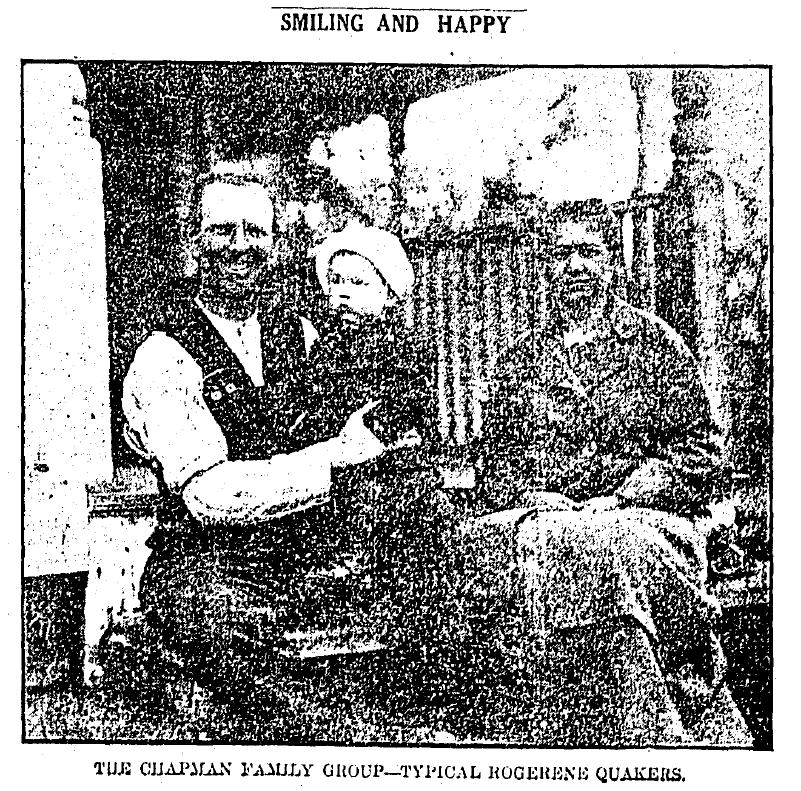
|
Once, following the prosecution and fining of members of the colony for non-observance of the school regulations of the state, the elders started a school of their own, which, it is pointed out, conformed to the state requirements, except in rulings regarding patriotic observances. Even then they were permitted to carry on their school without interference. However the school was discontinued and the children of Quakertown are again attending the Lambto[w]n public school, refraining, however, as before from taking part in patriotic exercises, refusing to salute the flag, and it is asserted have been known to leave the schoolroom when the other children were singing the “Star Spangled Banner” or “America.”
They have been the subject of denunciation by the other children, who pointed their fingers at them and have shrilled in tones of derision: — “Q-u-a-k-e-r-s. Q-u-a-k-e-r-s.”
But so far as known the taunted youngsters have made no efforts at retaliation, for the rigorous teaching of their elders was always in their minds.
Another Conflict.
Now these rural folk have come again into conflict with the school authorities, for the latter are determined that all children under instruction in the school shall be taught lessons of patriotism and civic responsibility. To the Quakers of the Lambto[w]n School District the authorities have already said: — “You must obey.”
To this the Quakers have replied: “You cannot make us. This is a free country founded on religious liberty. We do not believe in man made laws. We believe in God’s laws. That is our inalienable right.”
The authorities believe, while having no desire to infringe on the religious beliefs of these people, that the time has now come when they should realize the duty of cutting away so far from their early teachings as to take on the full duties of citizenship and that their children should conform to the full school regulations and move along patriotic lines with other children, and that instead of showing disrespect when the national anthem is sung they should be taught to appreciate its meaning and should show respect to the flag of the nation.
Appeal to Americanization Agent.
From its local aspect that situation has taken large proportions, for W. S. Dakin, state inspector of schools had brought the perplexing question to the attention of Robert C. Deming, director of the Americanization board, to see if some way cannot be found to bring about a proper conformity without putting the Rogerene-Quakers in a position of being persecuted for their religious beliefs.
School Laws in Questions.
The school laws, which Mr. Deming says the Quakers have been accused of failing to observe state that:
“The governor shall annually in the spring designate by official proclamation the fourteenth day of June as Flag Day and suitable exercises having reference to the adoption of the national flag shall be held in the public schools on that day, or in case that day shall not be a school day, on the school day preceding, or on such other days as the school visitors, board of education or town school committee may prescribe.
“The duties of citizenship including the knowledge of the form of national[,] state and local government shall be taught in the public schools as a regular branch of study to pupils above the fourth grade. The provision of this section shall apply to classes in ungraded schools corresponding to the grades designated herein. Normal schools and teachers training schools shall give instruction in said subjects and concerning methods of teaching the same. The state board of education shall prepare and distribute to every school and outline of questions and suggestions relating to said subjects and said outlines may be used in said schools.”
In an effort to obtain some light on the best way to solve the problem, Mr. Deming sent the following letter to various state officials and other prominent men: —
“Dear
Sir: —
“I
have before me a matter of very real interest and importance upon which I am
asking your opinion and advice as a citizen. A similar letter goes to other
representative men in the state whose opinions I value very highly. May I hear
from you on this subject at your earliest convenience?
“On
Monday, April 25th, I went to the Lambto[w]n School District of the town of
Ledyard with Mr. W. S. Dakin, state inspector of schools, who had complained to
me that in that district there were certain families—Quakers—who refuse to
recognize certain patriotic emblems. I found the following:
“In
this school four families are represented by children of the following ages—
Levi
Harvey, age 7, William Harvey, age 8, father, William Harvey.
Palmer
Watrous, age 11, Curtis Watrous, age 7, Priscilla Watrous, age 9, father,
Austin Watrous.
Paul
Watrous, age 9, Wallace Watrous, age 8, Edith Watrous, age 11, Maxon Watrous,
age 12, father, Stephen Watrous.
Mary
Whipple, age 9, father, Samuel Whipple.
“These
children upon the command of their parents refused to salute the American flag,
sing the national anthem and read any patriotic verse of any kind. This was
refused upon the ground that such things were symbols of war. When ‘America’ or
‘The Star Spangled Banner’ were sung the children immediately sat down.
“In
the past these parents have been prosecuted for failing to send their children
to school, have paid their fines and established a private school that
conformed to the requirements of the law with the exception of patriotic
observances, etc.
“Upon
visiting the homes of Mr. William Harvey and Mr. Stephen Watrous I found that
these parents believed in no ‘man made law,’ carried on activity to interest
others in their beliefs and recognized no fealty of any sort. They believed in
the sanctity of marriage and of property, but when asked if they would refuse
to expel a burglar looting the house replied in the negative. They stated that
any man or family that wished to settle on their property could do so without
being expelled. None of them are citizens of the state, nor have they ever
taken an oath of allegiance. They pay their taxes, obey the laws and are
apparently otherwise good citizens. They believe in the freedom of worship and
religion. Two of the young men were excused from the draft after reporting for
duty on the ground of being conscientious objectors. Subsequently one of these
young men accepted the government’s war bonus.
“Aside
from the four families who have children in the school there are several other
families who have no children, who make up this colony. These families are
descendants of ‘Jumping John Rogers’ of Westerly, R. I.”
No Martyrs
Desired.
While some of the replies received indicate doubt as to the wisdom of adopting any rigid course in an effort to make citizens of these people who assert that their attitude is in conformity with their conscience and religious beliefs, it is advised that no step be taken which might throw the halo of martyrdom about them. It is also suggested that before any move is made towards their “Americanization,” the authorities of other states should be consulted as to steps taken by them under similar conditions and their policies investigated.
Once before in recent years did this sect come into conflict with official and public opinion. It was when the country entered the world war. Here again the Rogerene-Quakers refused to depart from their beliefs. Their forefathers had stood by the faith in days of storm and stress and they and their children felt that they should do likewise, despite the criticism of their neighbors.
The colony established in the area now known as Quakertown came from the left wing of the Rogerene movement. The major part of the Rogerenes were situated in New London and were more liberal in their views so that they have merged with other doctrines and other faiths. But the Rogerenes of Quakertown, as the colony is called, were set apart by the Groton leader, John Waterhouse, whose rule bound them like a ring of steel.
Surrounded by the beauty of a district seldom traveled, the Rogerene-Quakers have turned up the soil, planted their crops and harvested them with the changing seasons, their life taken up wholly with their work and their religion. They will take no oath of allegiance. They will not vote. They respect the marriage contract and many of them have gotten their marriage licenses in Rhode Island to avoid the oath required in their native state. For years on Sunday they have gathered in the old Quaker meeting house, its clapboards ancient and weatherbeaten, and lifted up their prayers and sung their hymns.
Waterhouse
Describes Sufferings.
Only the principles which had been impressed in the minds of their forefathers by their leader, John Waterhouse, and handed down to them as their birthright remained; forgotten in this new day were the sufferings which he described [what follows was, in fact, written by Timothy Watrous, Sr., about his own—not his father’s—experiences; it appears in nearly this form in The Battle-Axe] thus: —
“In the fore part of my life the principal religion of the country was strongly defended by the civil power and many articles of the established worship were in opposition to the religion of Jesus Christ. Therefore I could not conform to them with a clear conscience. So I became a sufferer. I endured many sore punishments and cruel whippings. Once I received forty stripes save one with an instrument of prim, consisting of rods about three and one-half feet long, with snags an inch long to tear the flesh. Once I was taken and my head and face covered with warm pitch, which filled my eyes and put me in great torment. and in that situation I was turned out in the night and had two miles to go without the assistance of any person and but little help of my eyes. And many other things I have suffered, as spoiling of goods, mockings.
“But I do not pretend to relate particularly what I have suffered for it would take a large book to contain it, but in these afflictions I have seen the hand of God to hold me up; and I have had a particular love to my persecutors, which so convicted them that they confessed that I was assisted with the spirit of Christ.
|
|
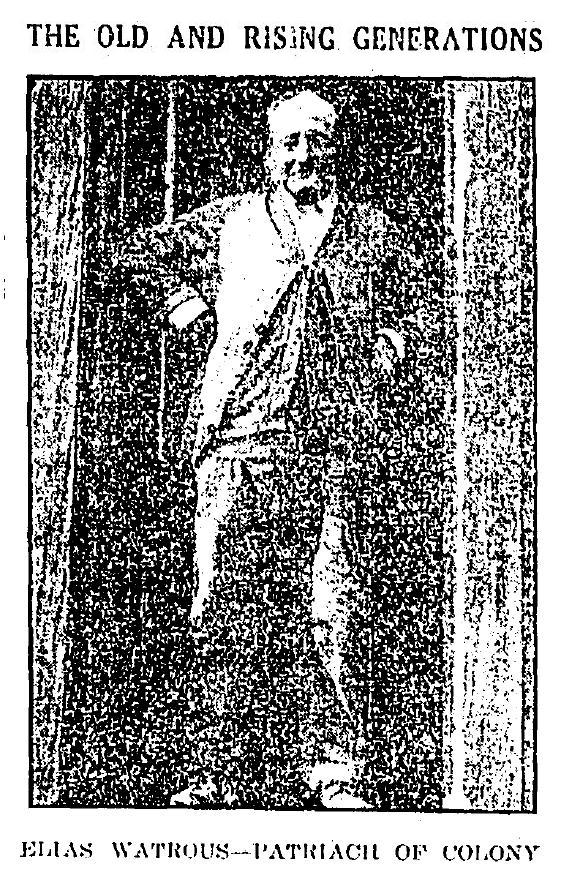
|
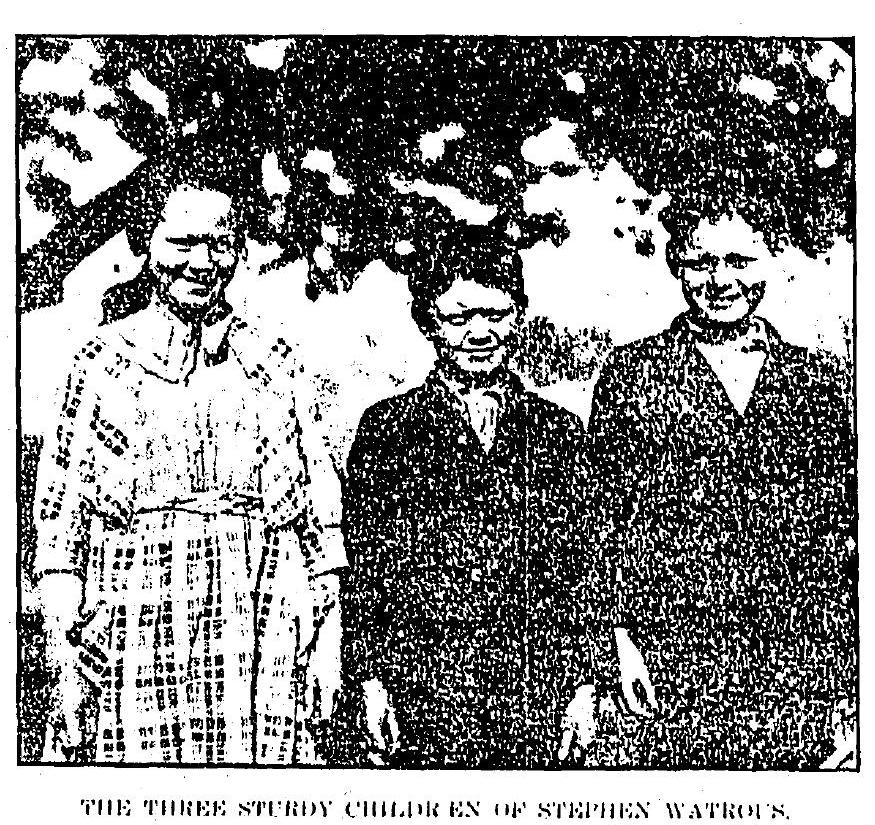
|
No War for Them.
It was with this heritage, this iron belief that God’s laws only were righteous, that the World war found them. They were still holding their services in the old Quaker meeting house near the home of Elias Watrous. There were nearly 100 including children in the colony. The state was swept over by a great wave of patriotism when America joined the Allies. New London was the scene of a center of this activity, warships were anchored there and the streets were thronged with the uniforms of khaki and navy blue. The Quakers although they seldom left their sheltered nook, by necessity became aware that the time had arrived for them, either to cast aside their doctrine, or to cling to it in the face of a bitter public opinion against all those who would not lay their all, even their lives on the nation’s altar. The Quakers held their meetings, discussed the question from every angle, and in the end with their Bibles in their hands reaffirmed their belief that war was criminal and killing in any form was nothing short of murder.
Vigorous Action.
Not many days had passed before rumors of this decision spread over the countryside and the meeting house gatherings were no longer peaceful. The feelings of their neighbors were too bitter to allow such action to pass unnoticed. The Quakers were classed under the general term of conscientious objectors. In the role of Quakers they had been respected, in the role of objectors they were scorned. Groups of young men and boys from nearby places attacked the Quaker meetings, and shattered the window panes with stones. They overturned the carriages in the meeting house yard and with loud shouts and flying stones drove the horses in all directions. Some of the younger boys procured the bodies of a rat and a snake and threw them in the midst of the worshippers. Missiles of every kind rained upon the heads of the Quakers and cries and hoots of derision drowned the voices of those raised in praise and prayer. The Quaker men came to the door and remonstrated. They were greeted with taunts and jeers, which died away only to be renewed although the Quakers did not lift a hand in their own defense.
Abandon Old
Meeting House.
Owing to the constant and annoying interruptions the services at the old Quaker meeting house were discontinued and were held thereafter in the separate houses of members of the colony.
|
|
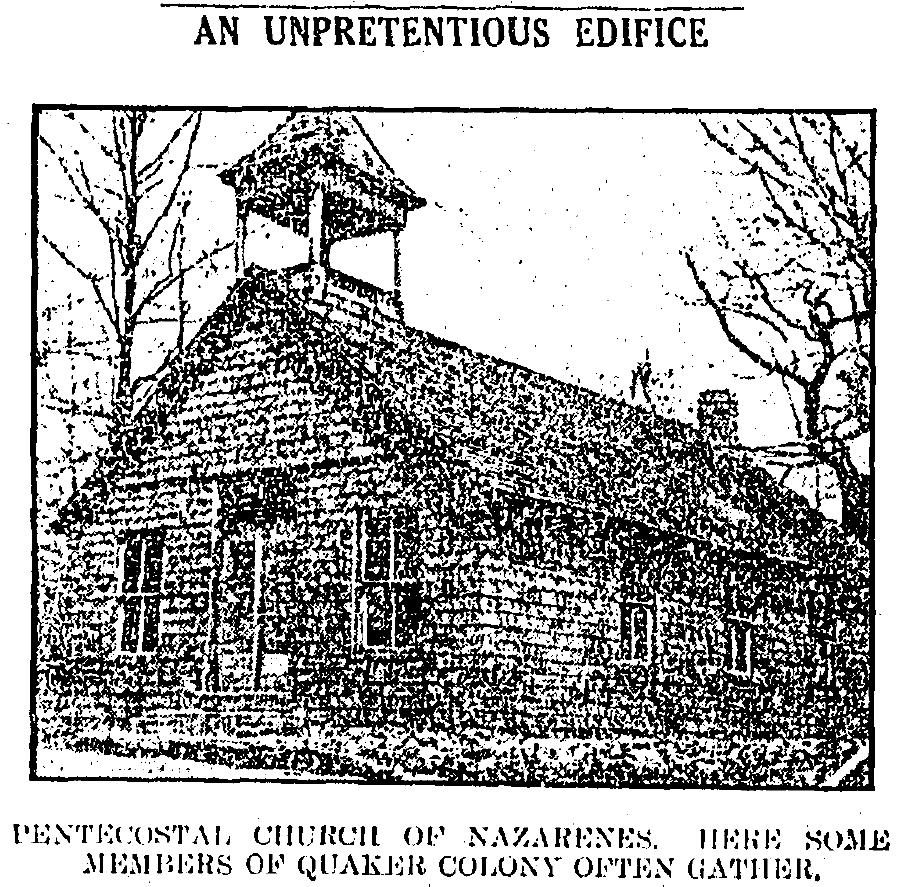
|
|
|
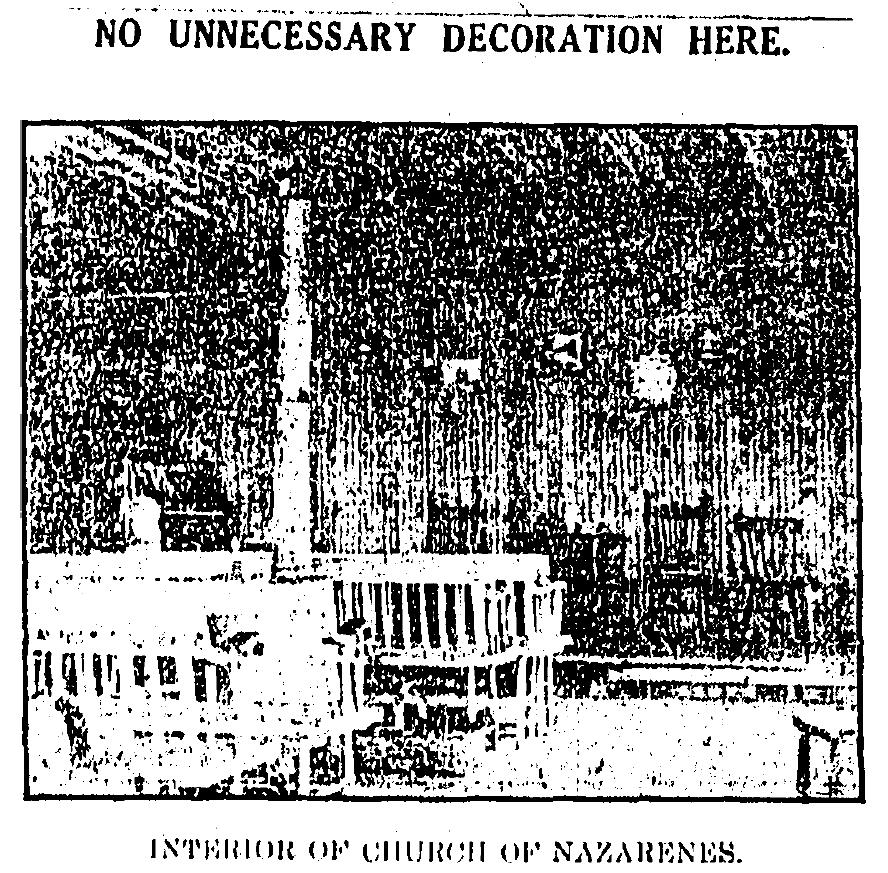
|
Nazarene Church.
Inside, the church is barren; a great deal as one would imagine such a place of worship would have appeared years ago, when the settlers were few and scattered. In the center of the room there is a crude stove, the rusty pipe of which strikes through the roof. The benches are hard wooded settees, a trifle more modern than those which kept the backs of the Puritans erect and uncomfortable enough to prevent drowsing. An old fashioned organ, strewn with hymn books, whose pages are yellow with age, adorns one corner. The pulpit is a crude table covered with cloth carrying the words: “Jesus only.” A highly colored strip of paper on which is printed the Lord’s prayer in a fancy scroll hangs on the wall at the front of the room and a picture of the Lord with this inscription: “Christ is the Head of This House.” In this meeting house many of the younger members of the Quaker colony have drawn apart from the beliefs of their forefathers. They have here listened to sermons by ministers of other denominations, who have traveled from nearby towns to preach at the Sunday services. These preachers have brought with them more of the teachings of the outside world than had hitherto penetrated the seclusion of Quakertown and the ears of the Quakers.
Another belief that of the “Gospel of Tongues” is finding a group of followers and tending to divide the faith of some of the colony. Stephen Watrous, whose family lives a short distance from the Pentecostal church, is a firm believer in this doctrine and claims that he can “speak in tongues,” a statement which several of the Quakers are inclined to scoff and ridicule.
Elder Elias
Watrous.
The figure of Elias Watrous stands out among the elders. He lives alone in one of the most ancient of all the homesteads. He is of the type of Rogerene leaders who established the branch of their sect in Quakertown and he has not departed from their doctrines set forth in the “Battle Axe,” a tattered and well thumbed copy of which he holds to this day. He might even now hold sway over the colony with the stern rule of his forebears had he been able to prevent many of the people from departing in various technicalities from the teachings of John Waterhouse as contained within the tattered pamphlet, which he treasures as one of the few still in existence.
Has Never Voted.
His face is not wholly stern as the accompanying photograph taken in the doorway of his home shows. His frame is long and lean, his iron gray hair in a breeze blows back in loose strands, his forehead is broad and high not unlike that of Benjamin Franklin. He was born in the Quaker colony nearly seventy years ago and he has seldom left its boundaries except in an occasional excursion to New London. He has been outside of the state but once, on this occasion going to Providence, R. I. He has never taken the oath of allegiance, nor has he voted in all his three score years and ten.
Loves His “Battle
Axe.”
Living apart and dividing his time between his work and the reading of his “Battle Axe” and his Bible after the custom of his forebears Elias Watrous was a bit shy. He leaned in his chair and weighed each thought carefully before giving it utterance. He admitted with a touch of pride that he had never voted. His faith was wholly in God, he declared, and in his teachings so that the laws of man had never troubled him.
“Do you believe in fighting?” he was asked.
The Elder looked at his questioner for several minutes, and then with the Yankee propensity of answering one question by asking another, he demanded:
“What are your beliefs on the subject?”
“I believe war is justified if it is in a good cause,” replied the interviewer.
“I don’t know any such people,” rejoined the aged elder.
Reason for His
Faith.
Questioned as to what grounds he based his failure to take the oath of allegiance, Mr. Watrous quoted several passages from the “sermon on the mount.” Outside the old house the leaves were stirred with a faint breeze of spring and the hillsides lay green in the light of a noon day sun. As he repeated the verses from memory, his voice was tremulous:
“Again ye have heard that it was said by them of old time, Thou shalt not forswear thyself; but thou shalt perform unto the Lord thine oaths.
“But I say unto you swear not at all, neither by heaven, for it is God’s throne.
“Nor by the earth, for it is his footstool: neither by Jerusalem; for it is the city of the great king.
“Neither shalt thou swear by they head, because thou canst not make one hair white or black.
“But let your speech be yea, nay, nay; for whatsoever is more than these cometh of evil.”
So the situation stands. The school authorities say: “This you must do.”
The Rogerenes reply: “This we may not do for our religion forbids.”
Hartford
Courant
[CT], May 8, 1921. pp. 1-2.
QUAKER
PUPILS’ REFUSAL TO SALUTE FLAG CALLED TO GOVERNOR’S ATTENTION
State
Americanization Director Writes That Ledyard Parents Command Children Not to
Sing National Anthem.
ARE DESCENDANTS OF ‘JUMPING JOHN ROGERS’
_____________
Refusal of ten pupils in Ledyard, children of Quakers, to salute the American flag or recognize any patriotic emblems has been called to the attention of Governor Lake by State Americanization Director Deming. On the ground that such things were symbols of war, parents of the children have commanded them to refuse to sing the national anthem or even to stand while it is being sung and to decline to read patriotic verse of any kind.
Director Makes
Investigation.
The following is a copy of the letter received by the governor: —
“Dear
Sir: —
“I
have before me a matter of very real interest and importance upon which I am
asking your opinion and advice as a citizen. A similar letter goes to other
representative men in the state whose opinions I value very highly. May I hear
from you on this subject at your earliest convenience?
“On
Monday, April 25th, I went to the Lambto[w]n School District of the town of
Ledyard with Mr. W. S. Dakin, state inspector of schools, who had complained to
me that in that district there were certain families—Quakers—who refuse to
recognize certain patriotic emblems. I found the following:
“In
this school four families are represented by children of the following ages:
Levi Harvey, age 7; William Harvey, age 8; father, William Harvey; Paul
Watrous, age 9; Wallace Watrous, age 8; Edith Watrous, age 11; Maxon Watrous,
age 12; father, Stephen Watrous; Palmer Watrous, age 11; Curtis Watrous, age 7;
Priscilla Watrous, age 9; father, Austin Watrous; Mary Whipple, age 9; father,
Samuel Whipple.
“These
children upon the command of their parents refused to salute the American flag,
sing the national anthem and read any patriotic verse of any kind. This was
refused upon the ground that such things were symbols of war. When ‘America’ or
‘The Star Spangled Banner’ were sung the children immediately sat down.
“In
the past these parents have been prosecuted for failing to send their children
to school, have paid their fines and established a private school that conformed
to the requirements of the law with the exception of patriotic observances,
etc.
“Upon
visiting the homes of Mr. William Harvey and Mr. Stephen Watrous I found that
these parents believed in no ‘man made law,’ carried on activity to interest
others in their beliefs and recognized no fealty of any sort. They believed in
the sanctity of marriage and of property, but when asked if they would refuse
to expel a burglar looting the house replied in the negative. They stated that
any man or family that wished to settle on their property could do so without
being expelled. None of them are citizens of the state, nor have they ever
taken an oath of allegiance. They pay their taxes, obey the laws and are
apparently otherwise good citizens. They believe in the freedom of worship and
religion. Two of the young men were excused from the draft after reporting for
duty on the ground of being conscientious objectors. Subsequently one of these
young men accepted the government’s war bonus.
“Aside
from the four families who have children in the school there are several other
families who have no children, who make up this colony. These families are
descendants of ‘Jumping John Rogers’ of Westerly, Rhode Island.
“Yours truly,
“Robert C. Deming.”
Committing
Children Suggested.
It has been suggested to the Americanization director that the proper course to pursue is to have such children committed to Connecticut institutions like other children who do wrong because of home influence.
It has been pointed out that if a boy stole fruit for instance at the command of his parents, the courts usually disposed of the case by committing the boy to the reform school at Meriden or, in the case of a girl, to the industrial school for girls at Middletown, for correction, at the same time removing the boy or girl from environments which would work against his or her becoming a good citizen. The argument has been advanced that there should be no exception for Quaker children whose home influences were working to prevent their becoming good citizens.
Hartford
Courant
[CT], May 12, 1921. p. 10.
WATROUS
DEFENDS QUAKER CHILDREN
Says Ledyard
Youngsters Not in Revolt Against Government.
_____________
(Special to The Courant.)
New London. May 12.
Ernest Watrous of Groton, a professed Quaker was interviewed today relative to the statements contained in the letter of Director of Americanization Robert C. Deming to Governor Lake as contained in “The Courant” last Sunday.
Mr. Watrous denied emphatically that the children of Ledyard, known as Quakers and descendants of “Jumping” John Rogers, were in a revolt against constituted authority or disloyal to the government.
“Quaker children believe in being true to the constitution of the United States, to American principles, and to the president of the nation,” he said. “They look upon the flag as the symbol which leads the armies to war, however, and as they are opposed to war they feel that honoring the flag tends to excite the people to the shedding of blood. Their action arises out of their religion. Quakers accept a literal interpretation of the New Testament which admonished that we must love our enemies. Moreover we do not believe in mixing church and state for a true Christian cannot be a politician.”